现代大学英语精读1第二版第九课课文分析
现代大学英语精读1-第九课课后参考答案
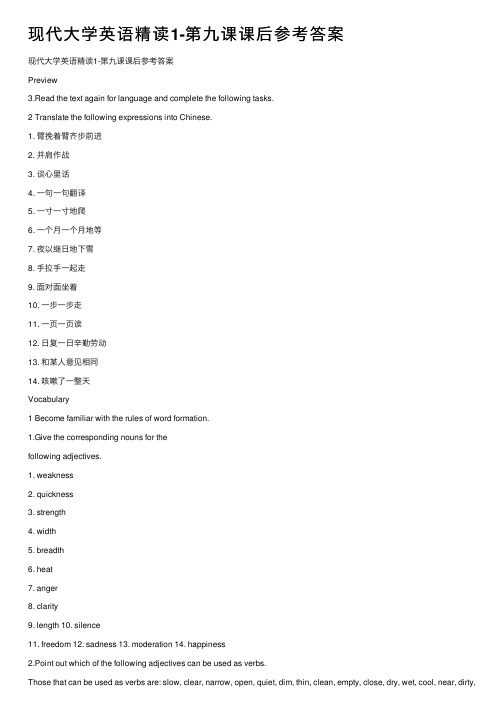
现代⼤学英语精读1-第九课课后参考答案现代⼤学英语精读1-第九课课后参考答案Preview3.Read the text again for language and complete the following tasks.2 Translate the following expressions into Chinese.1. 臂挽着臂齐步前进2. 并肩作战3. 谈⼼⾥话4. ⼀句⼀句翻译5. ⼀⼨⼀⼨地爬6. ⼀个⽉⼀个⽉地等7. 夜以继⽇地下雪8. ⼿拉⼿⼀起⾛9. ⾯对⾯坐着10. ⼀步⼀步⾛11. ⼀页⼀页读12. ⽇复⼀⽇⾟勤劳动13. 和某⼈意见相同14. 咳嗽了⼀整天Vocabulary1 Become familiar with the rules of word formation.1.Give the corresponding nouns for thefollowing adjectives.1. weakness2. quickness3. strength4. width5. breadth6. heat7. anger8. clarity9. length 10. silence11. freedom 12. sadness 13. moderation 14. happiness2.Point out which of the following adjectives can be used as verbs.Those that can be used as verbs are: slow, clear, narrow, open, quiet, dim, thin, clean, empty, close, dry, wet, cool, near, dirty,short---shorten strong---strengthen dark---darkenhot---heatbright---brighten sad---saddenred---reddenripe---ripenweak---weaken wide---widenthick---thicken quick---quicken cold---cool low---lower angry---angerhard---harden deep---deepenlong---lengthen (long在此作“长的”解,如作动词,意为“盼望”) broad---broadenfat---fattenlight---lighten (light这⾥作“轻的”解,如作动词,意为“点⽕”)soft---softenhigh---heighten3.Fill in the blanks with the correct form ofthe word “impress”.1. impressed2. impression3. impressed4. impressive5. impressionist6. impressionable2 Complete and translate the following expressions./doc/138548081.htmlplete the following verb + nounexpression.1. bag/pocket/gun2. stone/line/glance/doubt/vote3. keep4. make/fix/keep/have/break5. have6.one’s arm/animals/a prisoner/news7. club/arms/legs/stick9. strike10. one’s hand/a rope/meanings/anopportunity11. paper/map/tablecloth/plan5.Translate the following adjective + noun expressions into Chinese.1. 警惕的眼光,尚未点上的雪茄,奇数,对⾯,同声传译,和平共处,和平环境2. 常规做法,正常关系,常⼈,⼀般情况3. ⾚脚,头上不戴帽⼦,⾚⼿空拳,最低限度的必需品4. 直线,直路,直截了当的回答,绷着脸不笑5. 稍有增加,略有不同,轻微的程度,微笑的变化6. 宽阔结实的下颚,宽阔解释的肩膀,⽅形的花园,平⽅⽶7. 锐利的⽬光,强烈的兴趣,精明的头脑,敏锐的感觉8. 精明的头脑,锋利的⼑,利齿,说话尖酸刻薄,急剧增加,针锋相对的回答,急转弯,剧烈的疼痛,尖锐的批评,尖刻的评论,强烈的对⽐,尖锐的⽃争9. 稳定的⼯作,稳定的收⼊,稳定的增长,稳定的关系3 Give corresponding synonyms and antonyms for the following words and expressions 1Synonyms1. only just2. attempt3. stick4.smart/bright/shar p/keen5. throw6.think/suppose/gues s/believe7. good-looking8. catch9. talk10. cold11. move to and fro13. from time to time14. eat15. appear16. sharp17. rational18. shake2Antonyms1. abnormal2. considerable/great3. minority4. brighten5.roughly/approxim ately6. misfortune7.unsteady/shaky8. fill9. inferiority10. quicken11. software (如hardware作硬件解)12. uninteresting/bori ng/dull13. almost14. cheerfully4 Fill in the blanks with the correct form of the expressions listed below. Some expressions may be used more than once.6.under arrest7.get stuck/lose track of8.lose track of9.heard from10.change… into11.in existence 12.know of/doc/138548081.htmlpete with, catch up14.brought up, on earth, for show 15.asking for, torn down5 Fill in the blanks with the correct prepositions or adverbs.16.into, into18.from, up, in, for19.by, off 20.on, over21.out22.out, on23.over24.to, At, up 25.for, on6 Translate the following sentences into English.26.他开始事业很成功,但不久就被成功冲昏了头脑。
现代大学英语精读1 Unit 9
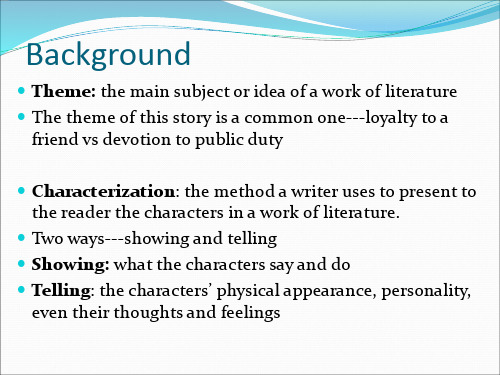
Bob
Jimmy
average height smart restless a bit slow ambitious strongly built ready to try in not so every adventurous way to reach his honest, truthful, goal responsible and He had made his devoted fortune, though. He was obviously He had many a good fights. police officer. He had broken the law.
cast one’s eye on/over/down sth: to look at, or read sth
quickly
the area was one that kept early hours. (2) people in that area closed their stores pretty early. all-night lunch counter (2) lunch counter: a counter in a store or restaurant where
Background
Theme: the main subject or idea of a work of literature The theme of this story is a common one---loyalty to a
friend vs devotion to public duty
Discussion
Do you think Jimmy did the right thing as a friend? If
现代大学英语精读1第二版第九课课文分析
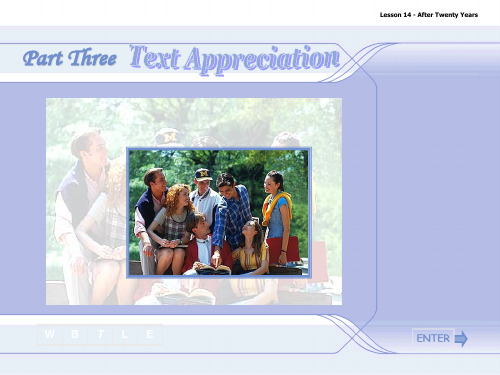
I. Text Analysis
Lesson 14 - After Twenty Years
Structure of the text
Part 1 (paras. 1—17) about: The policeman (Jimmy) met with Bob and had a conversation.
WB T L E
The end of the Plot.
Lesson 14 - After Twenty Years
I. Text Analysis
Lesson 14 - After Twenty Years
Setting of the story
On a business avenue of New York: The same hour: ten o’clock at night
Lesson 14 - After Twenty Years
II. Writing Devices
Ironic ending
We don’t know what happened twenty years ago that made them so special to each other. But it was clear that Jim was a good honest man and always true to his friends and Bob admired and trusted him. Slipping along this way, we would expect a very touching story. But the ending is very dramatic and surprising.
Lesson 14 - After Twenty Years
现代大学英语精读1第二版第九课课前活动
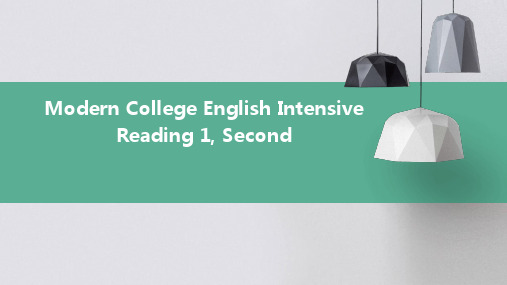
总结词
详细描述
总结词
详细描述
口语表达练习
学生可以通过朗读、角色扮演、小组讨论等方式进行口语表达练习,提高自己的口语流利度和自信心。
书面表达练习
学生可以通过写作练习,如段落写作、短文写作或摘要写作等,提高自己的书面表达能力,增强对英语语法的理解和运用。
01
02
03
04
Expression exercises
The main idea of the text is to emphasize the importance of reading in English language learning and provide practical tips and strategies for effective reading.
Pre reading question discussion
04
Listening and Speaking Training
1
2
3
Understanding Listening Materials
听力内容的讲解
对听力材料进行详细讲解,包括词汇、语法和语篇结构,帮助学生更好地理解听力内容。
听力材料的选择
Preparation
Before the discussion, students should familiarize themselves with the topic by doing research or preparing arguments. This will ensure a more meaningful and engaging discussion.
$number{01}
Modern College English Intensive Reading 1, Second
(完整word版)现代大学英语精读1课本内容及翻译
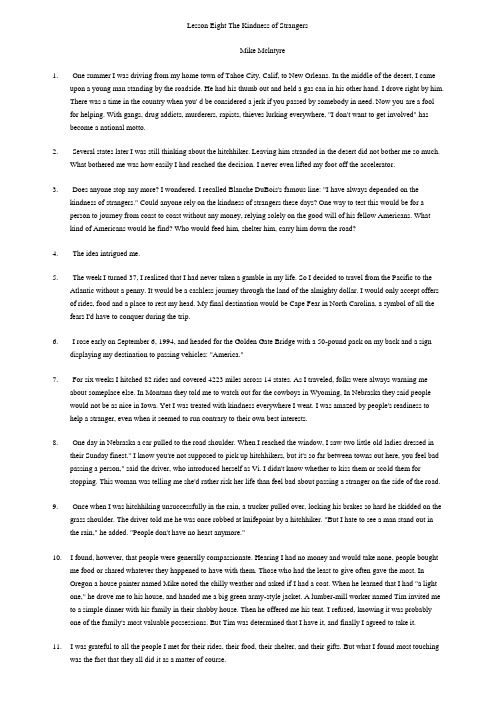
Lesson Eight The Kindness of StrangersMike Mclntyre1. One summer I was driving from my home town of Tahoe City, Calif, to New Orleans. In the middle of the desert, I cameupon a young man standing by the roadside. He had his thumb out and held a gas can in his other hand. I drove right by him.There was a time in the country when you' d be considered a jerk if you passed by somebody in need. Now you are a fool for helping. With gangs, drug addicts, murderers, rapists, thieves lurking everywhere, "I don't want to get involved" has become a national motto.2. Several states later I was still thinking about the hitchhiker. Leaving him stranded in the desert did not bother me so much.What bothered me was how easily I had reached the decision. I never even lifted my foot off the accelerator.3. Does anyone stop any more? I wondered. I recalled Blanche DuBois's famous line: "I have always depended on thekindness of strangers." Could anyone rely on the kindness of strangers these days? One way to test this would be for a person to journey from coast to coast without any money, relying solely on the good will of his fellow Americans. What kind of Americans would he find? Who would feed him, shelter him, carry him down the road?4. The idea intrigued me.5. The week I turned 37, I realized that I had never taken a gamble in my life. So I decided to travel from the Pacific to theAtlantic without a penny. It would be a cashless journey through the land of the almighty dollar. I would only accept offers of rides, food and a place to rest my head. My final destination would be Cape Fear in North Carolina, a symbol of all the fears I'd have to conquer during the trip.6. I rose early on September 6, 1994, and headed for the Golden Gate Bridge with a 50-pound pack on my back and a signdisplaying my destination to passing vehicles: "America."7. For six weeks I hitched 82 rides and covered 4223 miles across 14 states. As I traveled, folks were always warning meabout someplace else. In Montana they told me to watch out for the cowboys in Wyoming, In Nebraska they said people would not be as nice in Iowa. Yet I was treated with kindness everywhere I went. I was amazed by people's readiness to help a stranger, even when it seemed to run contrary to their own best interests.8. One day in Nebraska a car pulled to the road shoulder. When I reached the window, I saw two little old ladies dressed intheir Sunday finest." I know you're not supposed to pick up hitchhikers, but it's so far between towns out here, you feel bad passing a person," said the driver, who introduced herself as Vi. I didn't know whether to kiss them or scold them forstopping. This woman was telling me she'd rather risk her life than feel bad about passing a stranger on the side of the road.9. Once when I was hitchhiking unsuccessfully in the rain, a trucker pulled over, locking his brakes so hard he skidded on thegrass shoulder. The driver told me he was once robbed at knifepoint by a hitchhiker. "But I hate to see a man stand out in the rain," he added. "People don't have no heart anymore."10. I found, however, that people were generally compassionate. Hearing I had no money and would take none, people boughtme food or shared whatever they happened to have with them. Those who had the least to give often gave the most. In Oregon a house painter named Mike noted the chilly weather and asked if I had a coat. When he learned that I had "a light one," he drove me to his house, and handed me a big green army-style jacket. A lumber-mill worker named Tim invited me to a simple dinner with his family in their shabby house. Then he offered me his tent. I refused, knowing it was probably one of the family's most valuable possessions. But Tim was determined that I have it, and finally I agreed to take it.11. I was grateful to all the people I met for their rides, their food, their shelter, and their gifts. But what I found most touchingwas the fact that they all did it as a matter of course.12. One day I walked into the chamber of commerce in Jamestown, Tenn. to find out about camping in the area. The executivedirector, Baxter Wilson, 59, handed me a brochure for a local campground. Seeing that it cost $12, I replied, "No, that's all right. I'll try something else." Then he saw my backpack. "Most people around here will let you pitch a tent on their land, if that's what you want," he said. Now we're talking, I thought. "Any particular direction?" I asked. "Tell you what. I've got a big farm about ten miles south of here. If you're here at 5:30, you can ride with me."13. I accepted, and we drove out to a magnificent country house. Suddenly I realized he'd invited me to spend the night in hishome. His wife, Carol, a seventh-grade science teacher, was cooking a pot roast when we walked into the kitchen. Baxter explained that local folks were "mountain stay-at-home people" who rarely entertained in their house. "When we do," he said, "it's usually kin." This revelation made my night there all the more special.14. The next morning when I came downstairs, Carol asked if I'd come to their school and talk to her class about my trip. Iagreed, and before long had been scheduled to talk to every class in the school. The kids were attentive and kept asking all kinds of questions: Where were people the kindest? How many pairs of shoes did you have? Did anybody try to run you over? Did you fall in love with someone? What were you most afraid of?15. Although I hadn't planned it this way, I discovered that a patriotic tone ran through the talks I gave that afternoon. I told thestudents how my faith in America had been renewed. I told them how proud I was to live in a country where people were still willing to help. I told them that the question I had had in mind when I planned this journey was now clearly answered.In spite of everything, you can still depend on the kindness of strangers.第八课陌生人的仁慈1一个夏天,我正驱车从我的家乡加利福尼亚州的塔霍湖市前往新奥尔良。
现代大学英语精读第一册9讲述
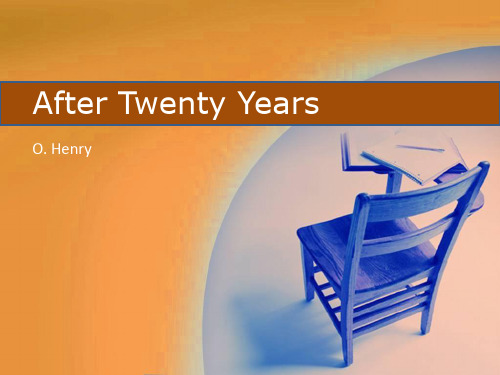
is to be one."---Ralph Waldo Emerson
4. "Be slow to fall into friendship; but when thou art in, continue firm
and constant.“ ---Socrates
5. "A friend to all is a friend to none;" "Misfortune shows those who
Cop and the Anthem”, “The Ransom of the Red Chief”
WB TR
Background
Author
The O. Henry Ending
• O. Henry's most famous stories make simple yet effective use of paradoxical coincidences to produce ironic endings. For example, in “The Gift of the Magi” a husband sells his watch to buy his wife a Christmas present of a pair of hair combs; unknown to him, she cuts and sells her long hair to buy him a Christmas present of a new chain for his watch. His style of storytelling became a model not only for short fiction, but also for American motion pictures and television programs. This kind of ending to a story is called an ironic ending, a surprise ending, or an O. Henry ending.
现代大学英语精读1第二版第九课语言点PPT课件

WB T L E
-
14
Lesson 14 - After Twenty Years
I. Word Study
12. strike v. to hit sharply or forcefully; to collide or
crash into; to make an attack; to ignite by friction; to come suddenly to the mind of Examples:
WB T L E
-
8
Lesson 14 - After Twenty Years
I. Word Study
6. empty v. to transfer or pour off completely;
to remove the contents of; to become empty Examples:
In New York city, the streets running from the west to the east are called streets, such as 31st street, and those running from the north to the south are often called avenues, such as the Fifth Avenue.
empty one’s glass into the sink The traveler emptied out all his pockets onto
the table, but still couldn't find his passport. This dreadful film soon emptied the cinema of
现代大学英语精读1-UNIT9-After-Twenty-Years--课文翻译

2014101018第九单元Translation of Text A二十年后1正在巡逻的警察精神抖擞的沿着大街走着。
他这样引人注目并不奇怪,并不是为了招摇,因为此时大街上根本没有什么观众。
时间还不到晚上十点钟,但夹带着雨意的冷风几乎清空了整个街道。
2警察边走边检查门是否关好了,他十分灵巧的不停转动着警棍,眼光还不时头像平静的街道,他那魁梧的身材,配上卓越不凡的气势,就是一副治安维持者的形象。
那个地区的人晚上休息的很早。
你偶尔还能看到一家雪茄店或是昼夜营业的饭店还在亮着灯,但是觉得大多数的店铺都已经关门了。
3在一个街区的半路上,警察忽然放慢了脚步。
在一家已经关门的五金店的门廊里,一个男子倚在那里,嘴里叼着一只未点燃的雪茄。
当警察朝他走去时,男人赶忙毫不犹豫的说。
4“没事的,长官。
”他坦然的说。
“我只是在等一个朋友,这是二十年前就定好的约会,听起来有点荒唐。
是吧?哦,如果你想弄明白事情的真相,我就说个你听。
大约二十年前,在这家五金商店说在的位置曾经是一家餐馆——“大乔”布雷迪餐馆。
”5“那家餐馆五年前还在,”警察说道,“后来就被拆除了。
”6门廊里的人划着火柴,点着了烟。
火光映出了一张苍白的,方正下巴的脸,一双尖锐的眼睛,右边眉毛附近还有一道泛白的疤痕。
他的领带夹上镶着一颗大钻石,镶的十分奇怪。
7“二十年前的这个晚上,”男子说,“我和吉米-威尔斯在大乔布雷迪餐馆共进晚餐,他是我最好的朋友,也是世界上最好的人。
我和他一起在纽约长大,亲如手足。
当年,我18岁,吉米20岁。
第二天早晨,我就要动身去西部赚钱去了。
吉米是无论如何也不会离开纽约的,他认为这是世界上最好的地方。
那天晚上我们定好,就在20年后的同一天,同一时间,我们都要在这里碰面,不管我们的情况如何,也不管我们相隔多远。
我们觉得不管怎么样,20年后的我们命运也应该有一个好结果了,该发财的也已经发财了。
8“挺起来有点意思,”警察说道。
“尽管在我看来,你们俩见面的时间间隔长了点,自从你离开后,你和你的朋友还有联系吗?”9“哦,有的,有一段时间我们相互通信。
- 1、下载文档前请自行甄别文档内容的完整性,平台不提供额外的编辑、内容补充、找答案等附加服务。
- 2、"仅部分预览"的文档,不可在线预览部分如存在完整性等问题,可反馈申请退款(可完整预览的文档不适用该条件!)。
- 3、如文档侵犯您的权益,请联系客服反馈,我们会尽快为您处理(人工客服工作时间:9:00-18:30)。
III. Sentence Paraphrase
W
B
T
L
E
Lesson 14 - After Twenty Years
I.
Text Analysis
Plot of the story Setting of the story
Have you got the key elements in the story?
W B T L E
The end of Ironic Ending.
Lesson 14 - After Twenty Years
II.
Writing Devices
Euphemism
Examples
A euphemism is a word or phrase used to mask a rude or offensive concept. This figure of speech provides a technique to avoid taboos by being polite. Many euphemisms are so common, that we don't even recognize them as such.
Lesson 14 - After Twenty Years
I.
Text Analysis
Structure of the text
Part 1 (paras. 1—17) about: The policeman (Jimmy) met with Bob and had a conversation. Bob was arrested by a plain clothes man Part 2 (paras.18—33) about: without his awareness until he found that the policeman was his expected friend Jimmy.
W B T L E
The end of the Setting.
Lesson 14 - After Twenty Years
I.
Text Analysis
Drama of the story
When they met again twenty years later, they should find themselves on opposite sides of the law—one was the man wanted by the police and the other turned out to be the police officer instructed to watch out for the runaway criminal. But no matter how much Jim had cherished their friendship, he would not let a personal relationship stand in the way of discharging his duty.
W
B
T
L
E
The end of Text Analysis.
Lesson 14 - After Twenty Years
II.
Writing Devices
Ironic ending
We don‟t know what happened twenty years ago that made them so special to each other. But it was clear that Jim was a good honest man and always true to his friends and Bob admired and trusted him. Slipping along this way, we would expect a very touching story. But the ending is very dramatic and surprising.
W
B
T
L
E
To be continued on the next page.
Lesson 14 - After Twenty Years
II.
Writing Devices
Euphemism
Examples:
We are experiencing heavy casualties. (many soldiers are being killed) There is a logjam in the river. (constipation)
W
B
T
L
E
To be continued on the next page.
Lesson 14 - After Twenty Years
I.
Text Analysis
Protagonists of the story
Jimmy:
Para. 2: the officer, with his strongly built form and slight air of superiority, made a fine picture of a guardian of the peace. Para.9: … “for he always was the truest, best old friend in the world.” Para. 13: “He was a kind of slow man, though, good fellow as he was.”
W
B
T
L
E
To be continued on the next page.
Lesson 14 - After Twenty Years
I.
Bob:
Text Analysis
Protagonists of the story
Para. 6: the light showed a pale, squarejawed face with keen eyes, and little white scar near his right eyebrow. Para. 9: “The West is a pretty big place, and I kept running around over it pretty lively.” Para. 13: “I‟ve had to compete with some of the sharpest brains going to get my money. It takes the West to make a man really keen.”
W
B
T
L
E
The end of the Structure.
Lesson 14 - After Twenty Years
I.
Text Analysis
Protagonists of the story
Bob
smart restless ambitious ready to try in every way to reach his goal He had made his fortune, though. He had many fights. He had broken the law.
Lesson 14 - After Twenty Years
Part Three
W
B
T
L
E
ENTER
Lesson 14 - After Twenty Years
Text Appreciation
I. Text Analysis II. Writing Devices
Ironic End on the next page.
Lesson 14 - After Twenty Years
I.
Text Analysis
Protagonists of the story
Bob:
Para. 6: His tiepin was a large diamond, oddly set. Para. 10: He pulled out a handsome watch, the lids of it set with small diamonds. Para. 31: He was wanted by the police.
exactly the same place and the
same hour twenty years later.
W B T L E
The end of the Plot.
Lesson 14 - After Twenty Years
I.
Text Analysis
Setting of the story
On a business avenue of New York: The same hour: ten o‟clock at night The same place:
Referring to Paras. 3, 4, 5 and 7 Referring to Paras. 1, 11
„Big Joe‟ Brady‟s restaurant 20 years ago—in the doorway of a hardware store now
W
B
T
L
E
The end of the Drama.
Lesson 14 - After Twenty Years
I.
Text Analysis
Theme of the story
Loyalty to friend VS. Devotion to duty
